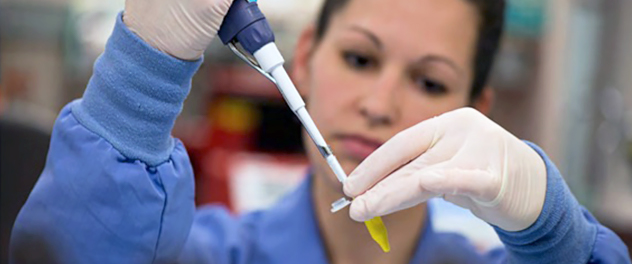-

Training the next generation of scientists
The Molecular Analysis of Human Diseases Laboratory is a student-centric environment that focuses on translating basic science findings into the clinic and training future leaders in the healthcare industry.
-

Developing novel therapies
A major focus of Dr. Hawse’s laboratory is identifying novel therapeutic approaches to treat cancer.
-

Disease in a dish
Dr. Hawse's team uses cell culture models, patient-derived tissue models and 3D bioprinting to recapitulate disease states and dissect the functions of specific genes and pathways in disease progression and response to therapy.
Overview
Mayo Clinic's Molecular Analysis of Human Diseases Laboratory, led by John R. Hawse, Ph.D., investigates the molecular mechanisms of hormone receptors, including estrogen receptor alpha (ERα) and estrogen receptor beta (ERβ) in normal cells and tissue, as well as in cancer development, progression and treatment.
The laboratory also studies the biochemical and molecular evolution of breast and ovarian cancer progression in the face of standard-of-care therapy to determine how molecular adaptations lead to cancer cell persistence and drug resistance. With this knowledge, the laboratory identifies new targets for drugs, devises new treatment strategies and conducts translational and preclinical studies that support the development of investigator-initiated clinical trials.
Our research team comprised of chemists, biochemists, molecular biologists and cell biologists functions in a highly collaborative and dynamic manner. We interact daily with clinical colleagues, including pathologists, oncologists, radiologists and surgeons, to study the most pressing and relevant issues affecting our patients.
We embrace the core values of Mayo Clinic and strive daily to provide more effective and less toxic treatment options for individuals battling these forms of cancer. Findings from our laboratory are transformative. To date, we have successfully moved our basic science discoveries into the clinic in the form of five early-phase clinical trials, with additional trials under development.
Affiliations
Dr. Hawse’s lab is affiliated with several research groups and organizations at Mayo Clinic.